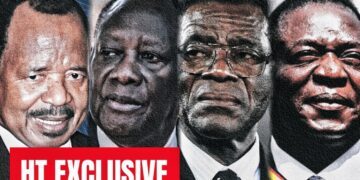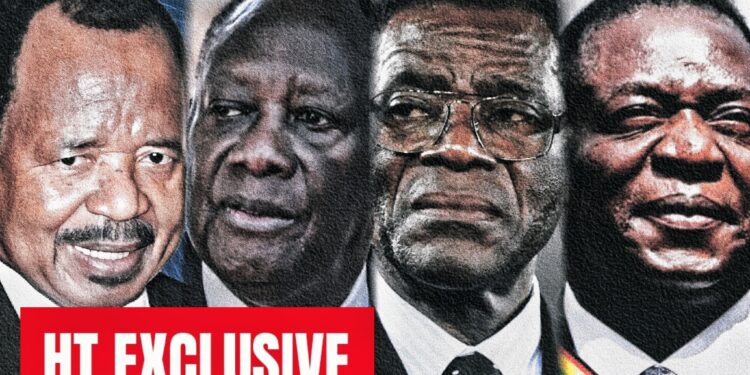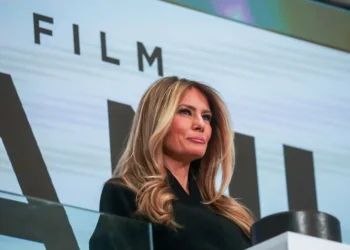By Emmanuel Nduka
In many African states, ageing leaders cling to power through mechanisms that stretch far beyond formal mandates, crafting a political landscape where succession is postponed and actively stifled. The younger generation who form the bulk of the population, and are more inundated with current global realities, are penciled out of leadership opportunities.
Cameroon exemplifies this trend, with 92-year-old President Paul Biya ruling since 1982 and rendering any talk of his departure a forbidden subject. The world’s oldest-serving Head of State had announced his intention earlier this month to seek re-election in the October 12 vote for the eighth time.
In a dictatorial move to pave way for little or no strong opposition to his reemergence, the commission responsible for conducting elections in Cameroon last week rejected the candidacy of Maurice Kamto. This was done under the watch of Biya, disqualifying Kamto who is the main rival to President Biya, in the upcoming presidential election in the central African country. Kamto came second in the 2018 presidential election with 14% of the vote. Biya had won by a landslide amid allegations of fraud.
In a country battling with economic challenges, to which Biya appears to have run out of solutions, the risk of anti-government demonstrations looms. “In case of the rejection of certain candidates in this election, it is possible there will be protests in the centre of Yaounde and near the seat of ELECAM,” the United Nations Department of Safety and Security said in a statement last Friday.
But the frail Biya is not alone in senescence leadership. There is President Alassane Quattara (83) in Côte d’Ivoire, President Teodoro Obiang Nguema (82) in Equatorial Guinea, President Emmerson Mnangagwa (82) in Zimbabwe, and several others.
Biya’s reluctance to step down is not isolated. It mirrors a continent-wide pattern where entrenched rulers prioritize self-preservation over democratic transitions. For many, leaving office risks prosecution, asset seizure, or exile. Thus, they consider prolonged tenure a shield against such threats.
Consequently, Africa’s younger generation finds itself systematically excluded from leadership, deepening a troubling disconnect between those who govern and those they claim to represent.
The strategies these leaders employ are intricate and deliberate. In Cameroon, Biya has fortified his grip by abolishing term limits in 2008, placing loyalists in key institutions, and shuffling security leadership to thwart potential challengers. By mid-2025, at age 92, he seemed poised for yet another electoral bid, while even whispers about his health or succession faced swift suppression. In October 2024, Interior Minister Paul Atanga Nji labeled speculation about Biya’s health a national security concern, issuing stern warnings to media outlets.
This culture of control extends beyond Cameroon’s borders. Across Africa, ageing leaders restructure constitutions, dominate security forces, silence dissent, and sideline rivals, creating a political climate where succession becomes is delayed and tagged as a taboo.
In Equatorial Guinea, since taking power in a coup in August 1979, Obiang Nguema has maintained his rule through a deeply entrenched authoritarian system. He has systematically dismantled political opposition by using legal decrees and constitutional changes to centralize power in the presidency. One of such was a 2012 constitutional amendment that eliminated age limits and reset term counts, allowing him to run indefinitely.
His regime suppresses dissent through arbitrary arrests, torture, and control of the media, while opposition parties and critics find themselves marginalized or imprisoned. There are also allegations that oil revenues have financed a patronage network that enriches his family and loyalists, especially through widespread corruption and nepotism, bolstering a political machine that reinforces his longevity in power.
In Southern Africa, 82-year-old Mnangagwa is holding onto power since assuming the presidency in 2017 after ousting Robert Mugabe. He has moved to consolidate his authority by reshuffling key security personnel amid rising factionalism within ZANU‑PF. In early 2025, he dismissed the army chief, police head, and intelligence director in a deliberate effort to neutralize potential coup threats and internal challengers, particularly from war veterans aligned with his vice president.
At the same time, Mnangagwa has maintained political effectiveness by invoking Zimbabwe’s liberation legacy and developmental progress, presenting ZANU‑PF as indispensable for national unity, an internal messaging strategy reinforcing his rule amid growing economic frustration. Though constitutional term limits exist, speculation persists that he may pursue changes or reinterpretations to remain beyond 2028 .
Côte d’Ivoire’s Ouattara, in office since 2011, was re‑elected in 2020 for a controversial third term after the Constitutional Court ruled that the 2016 constitution reset term limits, despite strong opposition and boycotts by rival parties claiming ineligibility.
Although Ouattara initially announced intentions to step down, his ruling party (RHDP) unanimously pushed him toward a fourth-term candidacy in 2025, citing a lack of viable successors and political stability tied to his leadership. Critics argue that this strategy which leverages constitutional reinterpretation and party endorsement, reflects an intent to retain power by limiting political alternatives and managing opposition through legal and institutional mechanisms rather than overt repression.
This refusal to yield power stems from multiple motives. From safeguarding personal privilege to evading legal accountability post-tenure, and a conviction that only they can ensure stability. In systems centered on a single figure, credible successors are rarely permitted to rise. In Cameroon, even speculation about heirs like Biya’s son Franck or close ally Ferdinand Ngoh Ngoh can spark political reprisals. HT Exclusive recalls that on November 6, 2022, in Yaoundé, defense and security specialist Aimee Raoul Sumo Tayo observed that, “Ministers have fallen into disgrace just for thinking about a theoretical departure of the president”. Her words highlight how succession is a perilous topic under Biya’s iron rule.
At the same event, political scientist Stéphane Akoa added, “Mr. Biya has put the saying ‘divide and rule’ into practice… forces which could have challenged him for power have been unable to get organised and, even less so, unify”. Together, these insights reveal a regime sustained by dismantling any hint of opposition.
The chasm between ageing leaders and Africa’s youthful population amplifies the crisis. In nations like Cameroon, where 65–70% of citizens are under 30, leaders in their 80s and 90s govern with scant relevance to younger realities. This generational rift is a continent-wide challenge. Africa’s youth, many of whom have known no other leadership, increasingly see their governments as detached and unaccountable, a perception that fuels unrest, particularly amid rampant youth unemployment and social discontent.
To justify their extended reigns, aging leaders often cite the need for stability during crises. Cameroon’s Biya claims his leadership has staved off widespread conflict in the country, yet the persistent Anglophone crisis and economic downturns tell an different story. This tactic is not unique to him. Across Africa, rulers point to internal or external threats to prolong their rule, often masking governance failures under the guise of necessity. Such justifications erode democratic accountability and perpetuate a cycle of stagnation.
The consequences of this leadership inertia are far-reaching. Youth alienation festers as governance grows corrupt and unresponsive. Without clear succession norms, transitions risk chaos, elite fractures, or military takeovers.
African analysts like Dr. Babayo Sule have called such regimes “authoritarian… exceeding the excesses of past military governments… with disregard for the rule of law,” a critique that resonates with the entrenched nature of these systems. In Cameroon, lawyer and activist Michèle Ndoki, during a nationwide tour in April 2025 across the Far North, North, and Adamawa regions, stressed civic oversight ahead of elections. “Our democracy depends on the vigilance of its people,” she declared. Her call underscores that entrenched power thrives where public engagement wanes.
Signs of Change
The good news is that glimmers of renewal exist elsewhere on the continent. Senegal’s Bassirou Diomaye Faye, elected in April 2024 at age 44, became the nation’s youngest president, promising transparency and youth inclusion, though his reforms face resistance from a legislature tied to his predecessor.
Zambia’s Hakainde Hichilema, elected in 2021 at around 59, and Tanzania’s Samia Suluhu Hassan, who took office in 2021 at 61, signal shifts toward dynamic leadership. Even Burkina Faso’s Captain Ibrahim Traoré, rising via a 2022 coup at age 37, reflects the allure of youthful rule, though his undemocratic path raises questions about sustainability. These cases offer hope, but their success hinges on stepping into, and dismantling entrenched systems.
Internationally, the differences are striking. France’s Emmanuel Macron, elected in 2017 at 39, embodies generational renewal within robust institutional checks. In the United States, debates over leadership age like former President Joe Biden’s unfolded openly, but term limits and strong frameworks prevent power from calcifying. These examples suggest that without institutional safeguards, ageing African leaders personalize authority and resist succession, entrenching their rule further.
Voices like Aimee Raoul Sumo Tayo and Stéphane Akoa, speaking in Yaoundé in November 2022, depict a Cameroon where even imagining a leadership change invites punishment. Michèle Ndoki’s April 2025 plea for citizen vigilance points to a remedy of an active public agency. Senegal, Burkina Faso, Zambia and a few others have shown that generational renewal is achievable, yet fragile. The way forward lies in bolstering democratic institutions, encouraging youth participation, and redefining leadership as a temporary trust, and not as a lifelong claim. Until then, the question lingers: when will they quit?



































